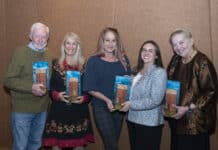Yavapai County election officials announced this week that packets to run for state and local office are now available at the county offices and, likewise, similar packets are available in Sedona and Verde Valley cities and towns.
The only county elections in presidential midterm years are constables, justices of the peace and judges in Yavapai County Superior Court. However, Arizona, like many states, holds statewide elections in the midterm cycles for governor, secretary of state, attorney general, treasurer, state mine inspector and superintendent of public instruction.
You wouldn’t think it, but state mine inspector is sometimes a fascinating, fun race; last cycle it pitted a candidate who looked like a suited, straight-laced mine foreman against a candidate who looked like an old-time prospector out of a John Ford Western.
I pray for a rematch.
All Arizona legislative seats and U.S. House of Representatives seats are up for election, as are one-third of the U.S. Senate; in 2022 it’s Class III senators, which includes U.S. Mark Kelly [D-Ariz.].
We highly encourage residents who are concerned about traffic, tourism mitigation, swelling budgets, sales taxes, economic diversity, affordable workforce housing, short-term rentals, to schedule a meeting with the city clerk or county election officials pick up a packet and get to work collecting signatures to put their name on the ballot.

There’s one resident on Birch Blvd. who has been particularly vocal on social media about the ills of vacation rentals and the doom-bringing tourists, demanding residents take action. He would be an excellent candidate for voters to weigh in on, but if he doesn’t pull a packet to run, then perhaps all his talk is just bluster.
Another vocal Sedona resident on Edgewood Drive who has all sort of ideas about traffic, the city budget and parking would also be a fine candidate, if he has courage to put in his name rather than speak from a distance.
I’m always amazed by how the candidates who run robust and fierce campaigns one cycle but lose, then completely disappear the next cycle. Some move away but others are still here. Why not run again? If they lost a mayoral race, run for council. Statistically, it’s easier to win.
We know of at least three candidates who will be running for mayor, but a fourth or fifth would certainly make the field more interesting. It would also dilute the potential votes and make a November runoff for the best two candidates more likely after the August primary and give voters a real choice based on their ideas rather than just name recognition.
Sedona City Council will also be electing three people as Councilmen Jon Thompson and Tom Lamkin and Vice Mayor Scott Jablow are up for reelection.
Of the 60 Sedona City Council members our city has had since incorporation in 1988, only seven have successfully run for re-election, plus two directly-elected mayors who won a total of five reelections [Sedona didn’t have direct elections for mayor until 2008; before that council as a body chose a mayor at the first meeting of the term]. Most candidates get into office, serve one term of two or four years, then walk away.
Collecting signatures might actually be the most difficult part of the election process because a potential candidate has to find a few hundred people to agree that they would be a good candidate for office. Voters can sign petitions for more than one candidate.
As a reminder, only residents in Sedona city limits can send a petition for Sedona City Council. They are roughly 6,100 residents of the Village of Oak Creek and an uncomfortable proportion mistakenly believe they are residents of Sedona itself because their postal 86351 ZIP code states “Sedona.” If VOC residents want to elect council members, they can move into Sedona or incorporate as a town.
Candidates can collect signatures from the clubs and nonprofits they attend, at the religious or social institutions where they spend time, by asking friends, family and neighbors in their neighborhood, going door-to-door talking to residents or by hosting a few listening sessions at coffee shops, the library, restaurants or other locations. Hosting such an event at a polo tournament — like a recent candidate for attorney general did — might send a message about the socioeconomic class one plans to serve to the detriment of others, but we doubt that local candidates are so tone-deaf.
Candidates can also solicit donations if they don’t want to spend everything out of their own pocket. Candidates generally spend funds on campaign yard signs, mailers and ads in the Sedona Red Rock News. Looking back at the last 16 years of elections, the candidates who spent the most on ads in our paper won the most votes, which is not to brag but merely to point out that fact and highlight the importance in getting one’s message to the most number of invested and involved voters.
Candidates can turn in their petitions between Monday, March 7, and 5 p.m. Monday, April 4. Before Election Day on Tuesday, Aug. 2, organizations will host forums and debates that we cover and we’ll reach out to all the candidates for a profile interview and candidate-written essay.
Christopher Fox Graham
Managing Editor



















